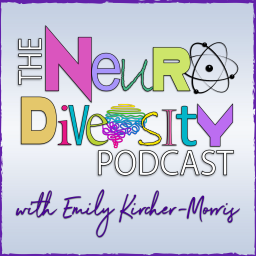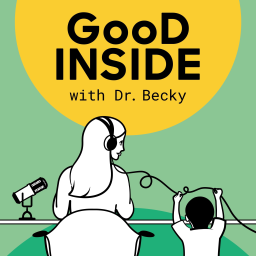
by Rachel Madel and Chris Bugaj
Join speech-language pathologists Rachel and Chris as they discuss supporting complex communication needs with alternative and augmentative communication (AAC) and assistive technology!
Language
🇺🇲
Publishing Since
11/1/2017
Email Addresses
0 available
Phone Numbers
0 available

April 24, 2025
In this episode, Rachel Madel and Chris Bugaj recap their experiences at ATIA 2025, highlighting the value of community-building during the pre-conference and the growing impact of generative AI in AAC and assistive technology. They discuss exciting new tools like Symbol Creator AI and Flex Speak, and reflect on key sessions around policy advocacy, emphasizing the power of personal stories in influencing change. The episode underscores the importance of collaboration, innovation, and using your voice to make a difference in the assistive tech space. Key Ideas This Episode: Collaborative Learning and Connection at Pre-Conference and SessionsChris & Rachel emphasized how the ATIA pre-conference fostered rich conversations and collaboration, particularly for professionals who often feel isolated in the AAC field. Participants valued the chance to share insights, ask questions, and build lasting relationships. The extended format of 1.5 days allowed for deeper dives into topics like coaching and core AAC strategies, enhancing both learning and community-building. Generative AI and Accessibility InnovationsA major theme was the evolving role of generative AI in assistive technology. Presentations explored how AI could enhance AAC use—like suggesting dialogue based on context or location (e.g., at Starbucks)—and improve communication speed and flexibility. Tools like Microsoft’s Accessibility Insights, the Flex Speak app for multilingual AAC, and Symbol Creator AI from Global Symbols were highlighted as promising developments that support more inclusive and customizable communication. Empowerment Through Policy, Advocacy, and StorytellingAmidst concerns over funding and administrative changes, attendees were encouraged to advocate for assistive technology by directly engaging policymakers. A standout session by ATIA’s policy advisor Laura Kaloi underscored the impact of personal stories in influencing legislation. The episode closed with a reminder that every professional’s and user's voice matters in shaping future access and innovation in the field. Help us develop new content and keep the podcast going strong! Support our podcast at patreon.com/talkingwithtech! Visit bit.ly/twtpod for access to previous episodes, resources, and CEU credits that you can earn for listening to TWT episodes!

March 12, 2025
This week, we share Chris and Rachel’s Q&A session with Professor Danielle Reed and her students at Midwestern University. They discuss interdisciplinary collaboration, the importance of mindset in AAC implementation, how occupational therapists can work effectively with speech-language pathologists, and more! Before the interview, Chris and Rachel touch on Chris’s experience teaching AAC to pre-service occupational therapy students, emphasizing interdisciplinary collaboration, mindset shifts, and the importance of making communication fun and engaging. Key Ideas This Week: 🔑 The Biggest Challenge in AAC Implementation Is Training Communication Partners – The main difficulty in teaching kids to use Augmentative and Alternative Communication (AAC) isn't the child’s ability but rather ensuring that parents, teachers, and therapists consistently model and support its use. Overcoming resistance and misconceptions among adults is a crucial part of AAC success. 🔑 Collaboration and Buy-In Are Essential for AAC Success – When selecting an AAC system, it’s important to involve the entire team, including parents, therapists, and educators. A collaborative approach ensures better long-term implementation and prevents division in decision-making that could hinder the child’s progress. 🔑 Mindset and Education Over Restriction – A common mistake in AAC is limiting vocabulary or access based on assumptions about a child’s capabilities. Instead of restricting words or making assumptions about a child's abilities, the focus should be on providing access to robust language and educating both the child and communication partners to use it effectively. Help us develop new content and keep the podcast going strong! Support our podcast at patreon.com/talkingwithtech! Visit bit.ly/twtpod for access to previous episodes, resources, and CEU credits that you can earn for listening to TWT episodes!

February 19, 2025
This week, we Share Chris’s interview with Saffron Murphy-Mann, Helen Hewson, and Andrea Sharples! Saffron Murphy-Mann is a specialist AAC teacher with a background in music, working in both mainstream and specialist settings to support young AAC users in accessing education and demonstrating their knowledge. Helen Hewson is an AAC user born with cerebral palsy, who has been using various forms of AAC since childhood and is now a trustee of Communication Matters, advocating for AAC awareness and supporting others on their communication journeys. Andrea Sharples is a speech and language therapist and the director of AT Therapy, an independent practice that provides AAC mentoring and support, employing AAC users with lived experience to inspire and guide others. All three are actively involved in Communication Matters, contributing to the organization’s mission of empowering AAC users and fostering a supportive community through conferences and advocacy! Before the interview, Chris and Rachel discuss the balance between accessibility and privacy, particularly in the context of AAC devices and personal information. They explore concerns about exposing personal identifying information on devices and luggage tags, while also considering how to maintain security and accessibility for users with fine motor challenges, such as using strong passwords with tools like sticky keys. Key Ideas This Week: 🔑 Empowering Individuals With AAC: Helen Hewson shared her personal journey with cerebral palsy and how AAC technology transformed her life, enabling her to communicate effectively and gain independence. Her story underscores the critical role AAC plays in breaking down barriers for individuals with communication disabilities, allowing them to express themselves, participate in education, and engage socially. 🔑 The Community and Inclusivity of the Communication Matters Conference: The CM conference is not just a professional gathering but a vibrant, inclusive community event that brings together AAC users, families, professionals, and manufacturers. The conference features a mix of educational sessions, social events (like the open mic night and fancy dress dinner), and opportunities for networking and collaboration. 🔑 The Growth of Communication Matters: The episode highlighted the growing popularity of the CM conference, which was sold out in 2024, and the plans to expand its reach in 2025, including attracting more international delegates and potentially hosting the largest AAC flash mob as a world record attempt! Visit talkingwithtech.org to listen to previous episodes, find new resources, and more! Help us develop new content and keep the podcast going strong! Support our podcast at patreon.com/talkingwithtech!

Meg Ferrell

ART19 Uniquely Human

Tara Phillips

Emily Kircher-Morris

Rachel Harrington, COTA/L, AC & Jessica Hill, COTA/L

ADDitude

The ADHD Parenting Podcast

Kim & Penn Holderness

The Free Press

Dr. Becky Kennedy

The Autistic Woman™

Wishbone Production

Venita

Lauren Streicher, MD

Glennon Doyle and Audacy
Pod Engine is not affiliated with, endorsed by, or officially connected with any of the podcasts displayed on this platform. We operate independently as a podcast discovery and analytics service.
All podcast artwork, thumbnails, and content displayed on this page are the property of their respective owners and are protected by applicable copyright laws. This includes, but is not limited to, podcast cover art, episode artwork, show descriptions, episode titles, transcripts, audio snippets, and any other content originating from the podcast creators or their licensors.
We display this content under fair use principles and/or implied license for the purpose of podcast discovery, information, and commentary. We make no claim of ownership over any podcast content, artwork, or related materials shown on this platform. All trademarks, service marks, and trade names are the property of their respective owners.
While we strive to ensure all content usage is properly authorized, if you are a rights holder and believe your content is being used inappropriately or without proper authorization, please contact us immediately at [email protected] for prompt review and appropriate action, which may include content removal or proper attribution.
By accessing and using this platform, you acknowledge and agree to respect all applicable copyright laws and intellectual property rights of content owners. Any unauthorized reproduction, distribution, or commercial use of the content displayed on this platform is strictly prohibited.
